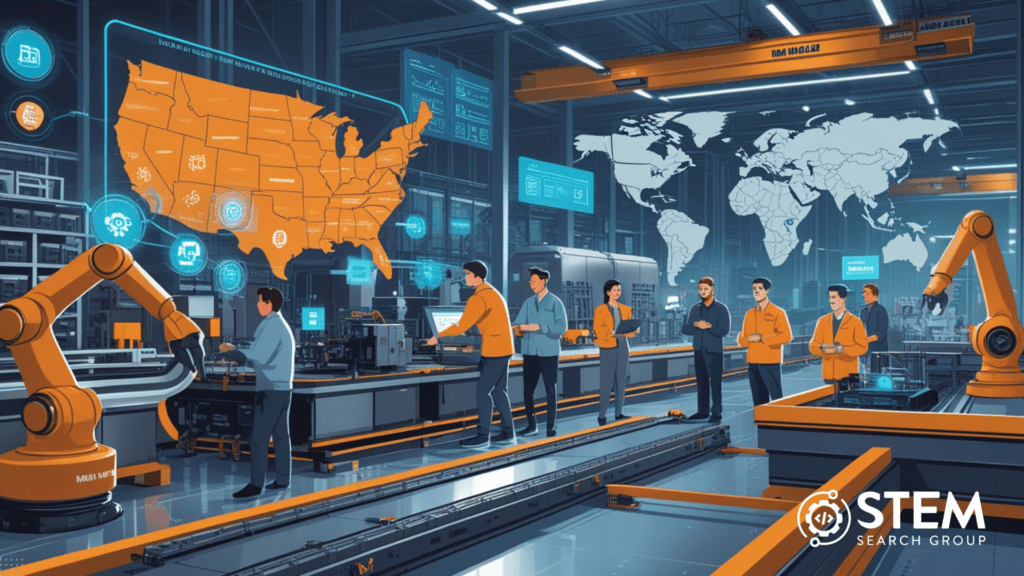2025 U.S. Manufacturing Trends: Navigating Policy Shifts and Talent Needs

Manufacturing Today predicts the U.S. manufacturing sector is poised for a significant rebound in 2025, with projections indicating a 4.2% increase in overall revenues and a 5.2% rise in capital expenditures. This optimistic outlook is driven by a combination of technological advancements, strategic investments, and favorable economic indicators. Let’s explore the key trends shaping U.S. manufacturing in 2025 and their implications for the industry.
Technology Takes Center Stage: AI, Automation, and Smart Factories
Industry 4.0 is transforming manufacturing through the integration of AI, automation, and the Industrial Internet of Things (IIoT). This technological shift is driving several key developments:
- Increased investments in semiconductor production and AI-related jobs
- Rising demand for automation engineers, AI specialists, and data analysts
- Improved operational efficiency and productivity through real-time data analysis
- Enhanced product quality and customization capabilities
- Streamlined operations and optimized employee utilization
- Cost reduction through automation and predictive maintenance
- Increased agility and flexibility in adapting to market demands
Reshoring and Supply Chain Resilience
Manufacturers are increasingly focusing on supply chain resilience by bringing production back to the U.S. This strategic move aims to enhance operational efficiency and reduce vulnerabilities. Key factors include:
- Potential tariffs on imports incentivizing domestic production
- Tax breaks and deregulation supporting reshoring initiatives
- Diversification of supplier locations to enhance supply chain stability
- Simplified supply chains with improved quality control and reduced lead times
Sustainability: The Green Manufacturing Imperative
Despite policy shifts, sustainability remains a critical focus for manufacturers:
- Adoption of green manufacturing processes, including closed-loop and lean practices
- Integration of renewable energy sources like solar, wind, and geothermal
- Implementation of sustainable supply chain management
- Focus on energy-efficient practices and waste reduction
The Talent Shortage: A Persistent Challenge
The U.S. manufacturing sector faces a significant talent crunch, with projections indicating millions of unfilled jobs by 2030. Key issues include:
- Retirement of experienced workers, particularly Baby Boomers
- Rapid industry growth due to reshoring and government incentives
- Misalignment between traditional education and evolving industry needs
Manufacturers are addressing this challenge through:
- Expanding talent pools to include non-traditional sources
- Investing in apprenticeships and upskilling programs
- Offering competitive wages and benefits to attract skilled workers
Policy Impacts: Opportunities for Growth
The current economic agenda presents opportunities for manufacturers to adapt and grow:
- Recent interest rate cuts by the Federal Reserve are expected to contribute to the sector’s recovery in early 2025
- Potential changes in trade policies create new opportunities for domestic production
- Additional tax cuts and deregulation could fuel growth, allowing manufacturers to invest in innovation and expansion.
In conclusion, U.S. manufacturing in 2025 is poised for growth and innovation, driven by technological advancements, strategic supply chain management, and a focus on sustainability. As the industry continues to evolve, addressing the talent shortage and leveraging policy opportunities will be crucial for success.
STEM Search Group is uniquely positioned to support U.S. manufacturers in meeting these challenges. With a nationwide reach and deep expertise, we offer tailored recruitment solutions that address the evolving needs of the industry. Our headquarters in the Southeast—a renowned manufacturing hub—provides us with unparalleled insights into regional and national talent pools.
Our comprehensive expertise spans a wide range of critical manufacturing roles, including leadership positions, plant management, and various engineering disciplines such as electrical, mechanical, quality, industrial, controls, robotics, biomedical, and chemical engineering. We also specialize in process engineering, embedded systems/IoT, materials and supply chain management, maintenance management, tooling, and health & safety roles.
In the technology and innovation space, we focus on software engineering, AI/ML & data science, DevOps, infrastructure, database/data warehouse, big data, and security/access. Additionally, we support quality assurance, design assurance, and regulatory affairs, ensuring compliance and excellence in manufacturing processes.
Our ability to source scientists and researchers further enhances our capacity to support R&D initiatives, driving innovation and growth in the industry. By leveraging our extensive knowledge, innovative recruitment strategies, and commitment to quality, we help U.S. manufacturers build the skilled teams they need to drive innovation, increase efficiency, and maintain their competitive edge in the global market.
As the manufacturing landscape continues to evolve, STEM Search Group remains a trusted partner in navigating the complex talent acquisition challenges of the industry.
